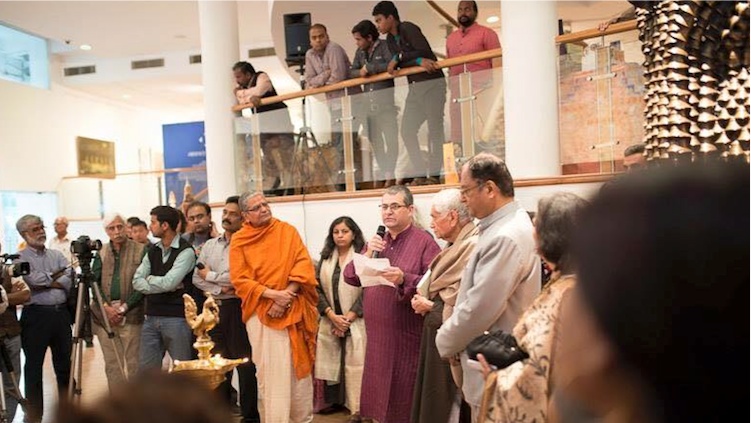Forms of Devotion Art Exhibit Launches in New Delhi
By Madhava Smullen | Mar 26, 2015

Over 500 people attended the inauguration of the exhibit “Forms of Devotion: The Spiritual in Indian Art” at New Delhi’s prestigious Lalit Kala Akademi on March 21st.
The exhibit features about 400 works by nearly 200 artists, selected from the Museum of Sacred Art’s (MOSA’s) permanent collection of over 1,600.
MOSA is based at ISKCON Radhadesh in the Belgian Ardennes, and also has a branch at Villa Vrindavana near Florence, Italy. Its founding director Mahaprabhu Das (Martin Gurvich), is the secretary of the Hindu Forum of Belgium and the son of Uruguayan artist Jose Gurvich.
Mahaprabhu gave a speech introducing Forms of Devotion at the inauguration, which began at 6pm and also included Vedic chanting by students of Varanasi’s Veda Sanskrit Institute; hymns by the Vocal Rasta Acapella Ensemble; and meditative bhakti and Kabir singing by Mahesha Ram and his group from Rajasthan.
The Forms of Devotion exhibit, curated by the former head of the British Council of India’s Arts and Culture department, Sushma K Bahl, will run until April 26th. The exhibit was preceded by a preview of a few works at the India Art Fair in Delhi, where it received a very positive reception.
The works, by mostly Indian artists, explore themes of spirituality and devotion through not only Hindu but also many other ideologies, philosophies and faiths present throughout India, such as Christianity, Islam, Jain, Sikh, Buddhist, and more.

Mahaprabhu shows the book Forms of Devotion to a customer
The inclusive project aims to promote interfaith dialogue, respect of others’ worldviews, and positive interaction between modernity and tradition.
“In his work with the Hindu Forum Mahaprabhu tries to bridge gaps between faiths,” says MOSA general manager Dridha Vrata Das, a second gen ISKCON devotee who has studied traditional South Indian art. “So he’s trying to do that through art too.”
In addition the artwork is executed not only in traditional styles from North and South India, but also a variety of different styles such as tribal and contemporary.
The exhibit includes Krishna paintings by renowned traditional artist B.G. Sharma, as well as pieces by big names in contemporary Indian art such as S.H. Raza, Subhaprasanna Bhattacharjee, Satish Gupta, and Anjolie Ela Menon.
There are also Vaishnava paintings by ISKCON artists from the USA such as Puskara Das, Ram Das Abhirama Das, Bhaktisiddhanta Das, Dhruva Maharaja Das, and Dridha Vrata. Many of these worked directly under ISKCON Founder Srila Prabhupada, who described their paintings as “windows to the spiritual world.”
Some pieces are hugely impressive in scope: one standout work by Manjunath Kamath is twenty feet tall and comprises 1,008 miniature water color and tea stain paintings that depict the Vishwarupa, or Universal Form Lord Krishna displayed to his devotee Arjuna.

Staff assemble Manjunath Kamath’s 1008-painting Vishwarup piece
Mediums used include oil paint, acrylic, natural pigments, metal castings, woodwork, stone sculpture, photographs, installations, and digital and video art creations.
“The idea is to show people that you can demonstrate devotion through cultural expression like art,” says Dridha Vrata.
The exhibit itself will be accompanied by the “Sacred Arts Festival,” which will put on many permances and activities inspired by the galleries throughout Forms of Devotion’s run. Some will take place in and around the galleries, others at the nearby Meghdhoot theatre.
These will include a Behrupiya dramatic performance on Hanuman; Kathakali dance; Sufi and bhajan music; workshops on woodcarving, miniatures, and Pichvai/Nathdwara painting; art workshops for children; storytelling sessions; and guided tours.
On March 22nd, there was a screening of well-known director Gautam Gosh’s documentary film Studios of Devotion, in which around twenty artists featured in Forms of Devotion are seen at work in their own environments. There will be a repeat screening on April 18th.
A day-long seminar entitled “The Sacred and The Arts” followed on March 23rd, with panel discussions on What is Sacred?, The World Within, and The Sacred and the Secular in the Arts.
The exhibit is also accompanied by a two-volume illustrated book edited by Sushma K Bahl and co-published by MOSA and Niyogi Books. Designed as a box set with over 500 pages in each book, it features nearly a thousand recently created works of art from MOSA’s collection. It also includes essays on Indian art in the sacred genre by scholars such as Devdutt Pattanaik, Dr Madhu Khanna, Kenneth R. Valpey, and Steven Rosen.
“We hope that in a modern India, this exhibit will show that people can still appreciate devotional themes, and that devotion is not just some outdated thing,” says Dridha.
After its run in New Delhi, Forms of Devotion will embark on a five-year international tour, beginning in Bangkok and Shanghai.
“This has been an amazing spiritual journey, full of discovery, joy, new relationships and friendships,” says Mahaprabhu Das. “I hope that such a project will bring great awareness of India’s vast and diverse culture.”















